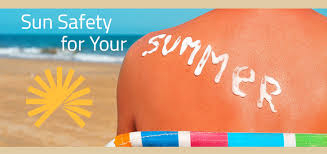Sun Safety Awareness

Sun Safety Awareness
As the month of June officially welcomes Summer, and most of us plan to enjoy more time outdoors, it seems the perfect time to increase sun safety awareness and to remind everyone to protect your skin from overexposure to UV rays of the sun.
Here are some great tips from the National Council on Skin Cancer Prevention to help you stay sun safe:
SLIP, SLOP, SLAP & WRAP!
Slip on a shirt
Slop on Broad-spectrum sunscreen of SPF-30 or higher
Slap on a wide-brimmed hat
Wrap on sunglasses
Skin cancer is on the rise in the United States, and the American Cancer Society estimates that one American dies every hour from skin cancer. This year alone, the American Cancer Society estimates there will be more than 73,870 new cases of malignant melanoma, the most serious form of skin cancer, and more than two million new cases of basal cell and squamous cell skin cancers in the U.S. Fortunately, skin cancer is highly curable if found early and can be prevented.
Because no single step can fully protect you and your family from overexposure to UV radiation, follow as many of the following tips as possible:
- Do Not Burn or Tan
- Seek Shade
- Wear Sun-Protective Clothing
- Generously Apply Sunscreen
- Use Extra Caution Near Water, Snow, and Sand
- Get Vitamin D Safely
The best way to detect skin cancer early is to examine your skin regularly and recognize changes in moles and skin growths.I also highly recommend that after age 50 you see a dermatologist once a year for a full body check to screen for any pre-cancerous spots or skin cancers.
Most skin cancers are caused by overexposure to UV radiation. Individuals with lighter-toned skin are more susceptible to UV damage, although people of all races and ethnicities can be at risk for skin cancer. Those who have a family history of skin cancer, plenty of moles or freckles, or a history of severe sunburns early in life are at a higher risk of skin cancer as well. To minimize the harmful effects of excessive and unprotected sun exposure, protection from intense UV radiation should be a life-long practice for everyone.
Most of this information comes from The National Council on Skin Cancer Prevention, a united voice to reduce skin cancer incidence, morbidity, and mortality, through awareness, prevention, early detection, research, and advocacy.
